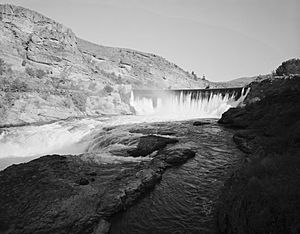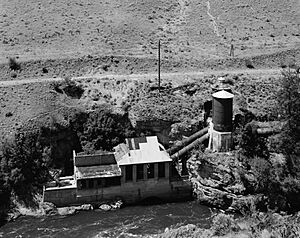Enloe Dam and Powerplant facts for kids
Quick facts for kids Enloe Dam |
|
|---|---|

Enloe Dam from downstream
|
|
| Location | Okanogan County, Washington |
| Coordinates | 48°57′57″N 119°30′03″W / 48.96583°N 119.50083°W |
| Construction began | 1919 |
| Opening date | 1920 |
| Operator(s) | Okanogan County Public Utility District |
| Dam and spillways | |
| Type of dam | Concrete gravity arch |
| Impounds | Similkameen River |
| Height | 54 feet (16 m) |
| Length | 290 feet (88 m) |
| Width (crest) | 6 feet (1.8 m) |
| Width (base) | 41 feet (12 m) |
| Spillway type | Uncontrolled ogee overflow |
| Reservoir | |
| Total capacity | 507 acre-feet (0.000625 km3) due to siltation |
| Power station | |
| Turbines | abandoned |
|
Enloe Dam and Powerplant
|
|
| Nearest city | Oroville, Washington |
| Area | 3 acres (1.2 ha) |
| NRHP reference No. | 78002764 |
| Added to NRHP | October 18, 1978 |
The Enloe Dam, also known as the Similkameen Dam, is a concrete dam on the Similkameen River. It is located about 4 miles (6.4 km) west of Oroville, Washington. The dam stands just above Similkameen (Coyote) Falls. It is a special type of dam called an arch-gravity dam, which means it uses both its curved shape and its weight to hold back water.
The Enloe Dam is about 54 feet (16 m) tall and 290 feet (88 m) long at the top. It was built between 1916 and 1923. The dam was named after Eugene Enloe, who was the president of the Okanogan Valley Power Company. Its main job was to help generate electricity at a power plant located downstream. However, the Enloe Dam does not have special "fish ladders" that help fish swim past it. Because of this, it completely blocked fish like salmon from swimming upstream into the Similkameen River and its smaller streams in Canada.
Contents
History of the Enloe Dam
The Enloe Dam replaced an older dam that was made of wood. This first dam was started in 1903 by a local businessman named J.M. Hagerty. It was finished a year after he passed away. This wooden dam sent water to a power plant that was also made of wood, located below the dam and the falls.
Powering Local Towns and Mines
The electricity from this early power plant went to towns like Nighthawk and Oroville. It also powered nearby mines such as Owasco, Ivanhoe, Ruby, and Canba. After Hagerty's death, his family tried to sell the wooden dam in 1913, but no one was interested. This was partly because the wooden dam was in poor condition.
Building the New Dam
In 1916, Eugene Enloe of the Okanogan Valley Power Company managed to get the rights to build a new dam at the site. He hired C.F. Uhden to design the new dam that same year. Construction on the concrete dam began in 1919 and was finished in 1920. It cost about $350,000 to build, with $150,000 coming from Enloe himself.
In 1923, Enloe sold the dam and its power plant to the Washington Water Power Company. This company then added a second large pipe, called a penstock, to carry more water to the power plant.
How the Dam Works
The Enloe Dam has a spillway that lets water flow over the top without being controlled. The height of this spillway could be made taller by adding special boards called flashboards. The power plant at the dam replaced an older, smaller plant that used the natural flow of the river to make electricity.
Changes in Ownership and Operation
The Washington Water Power Company bought the dam in 1923. Later, in 1942, the Okanogan Public Utility District (PUD) bought the dam from them. The Okanogan PUD stopped using the Enloe Dam to make power in 1958. This was because they could get electricity from the Bonneville Power Administration system for a lower price.
The area behind the dam, which is supposed to be a reservoir, stretches about 2 miles (3.2 km) up the Similkameen River. However, it has become largely filled with a lot of mud and sand over the years. Because of this, it is only about 9 feet (2.7 m) deep and can hold only a small amount of water, about 507 acre-feet (625,000 m3).
The Powerhouse Building
The concrete building that once housed the power generators is now partly in ruins. There have been discussions about whether to fix it up or tear it down if new power generation plans go forward. This powerhouse used to get water from two large wooden pipes, each 7 feet (2.1 m) wide. These pipes fed water to special wheels called Pelton wheels, which then powered two generators. Each generator could make 1.6 megawatts of electricity. Next to the generator hall is a strong, heavily built room where transformers were kept.
Future of the Enloe Dam
The Okanogan Public Utility District (PUD) has tried several times to get a new license to generate power at the dam. They received a license from the Federal Energy Regulatory Commission in 1983, but it was taken away in 1986. This happened because they had not solved the problem of how the dam affected fish that swim upstream, like salmon.
New Plans and Challenges
A second license for a 4.1-megawatt power plant was given in 1996. However, this license was also canceled in 2000 for the same reason: the dam's impact on fish. Another application was sent in August 2008. This plan aimed to build a new power plant that could generate 9 megawatts of electricity, using a new water intake channel.
The Enloe Dam was added to the National Register of Historic Places on October 18, 1978. It was recognized as an important example of how power was developed in rural Washington a long time ago.
Abandoning Power Plans
After a study showed that restarting power generation at the dam would be too expensive, the Okanogan PUD decided in 2019 to stop their plans. They are now trying to give the dam away so that it can be torn down. However, removing the dam is also very expensive. The Colville Indian tribes are very interested in having the dam removed. They want to help salmon return to the Similkameen River, which is an important part of their culture and ecosystem.
Images for kids
Historic American Engineering Record (HAER) No. WA-6, "Enloe Dam, On Similkameen River, Oroville vicinity, Okanogan County, WA" HAER No. WA-6-A, "Enloe Dam, Power House, On Similkameen River, Oroville vicinity, Okanogan County, WA"
 | Leon Lynch |
 | Milton P. Webster |
 | Ferdinand Smith |




